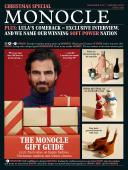
Issue 109
Christmas special. Lula’s comeback – exclusive interview. And we name our winning soft power nation.
In This Issue
Oops! No content was found.
Looks like we no longer have content for the page you're on. Perhaps try a search?
Return Home
Click here to discover more from Monocle

Christmas special. Lula’s comeback – exclusive interview. And we name our winning soft power nation.
Looks like we no longer have content for the page you're on. Perhaps try a search?
Return Home